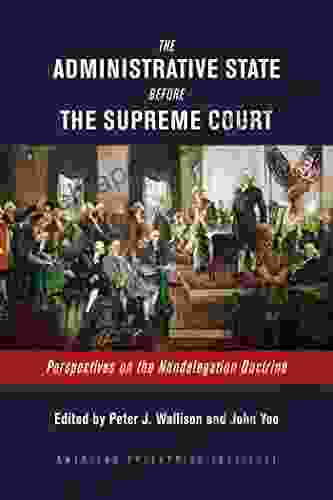The Administrative State Before the Supreme Court: A Comprehensive Guide

By [Author's Name]
The administrative state is a term used to describe the vast network of federal agencies, boards, and commissions that exercise significant power over American life. These agencies are responsible for everything from regulating the economy to protecting the environment to providing social welfare benefits.
The administrative state has been the subject of intense debate in recent years. Critics argue that it is too powerful and unaccountable to the people. They say that agencies often make decisions that are arbitrary, capricious, and harmful to the public interest.
5 out of 5
| Language | : | English |
| File size | : | 963 KB |
| Text-to-Speech | : | Enabled |
| Screen Reader | : | Supported |
| Enhanced typesetting | : | Enabled |
| Word Wise | : | Enabled |
| Print length | : | 397 pages |
| X-Ray for textbooks | : | Enabled |
Defenders of the administrative state argue that it is essential for regulating the complex modern economy and protecting the public from harm. They say that agencies are subject to a variety of checks and balances, including judicial review and congressional oversight.
The debate over the administrative state is likely to continue for many years to come. The Supreme Court has played a major role in this debate, and its decisions have had a significant impact on the shape of the administrative state.
In this comprehensive guide, we will explore the history of the administrative state, the legal challenges it has faced, and the key Supreme Court decisions that have shaped its development.
The administrative state has its roots in the late 19th century, when Congress began to delegate more and more power to agencies to regulate the economy and protect the public. This delegation of power was driven by a number of factors, including the increasing complexity of the economy, the rise of new technologies, and the growing population of the United States.
The first major agency to be created was the Interstate Commerce Commission (ICC),which was established in 1887 to regulate the railroad industry. In the years that followed, Congress created a number of other agencies, including the Federal Trade Commission (FTC),the Securities and Exchange Commission (SEC),and the Federal Communications Commission (FCC).
These agencies were given broad powers to investigate, regulate, and enforce the law. They were also given the power to make decisions that had a significant impact on the lives of Americans.
The growth of the administrative state accelerated during the New Deal era, when President Franklin D. Roosevelt created a number of new agencies to help implement his economic recovery plan. These agencies included the National Labor Relations Board (NLRB),the Social Security Administration (SSA),and the Tennessee Valley Authority (TVA).
After World War II, the administrative state continued to grow, as Congress created new agencies to address a wide range of issues, including environmental protection, consumer protection, and workplace safety.
The administrative state has faced a number of legal challenges over the years. Critics have argued that agencies are too powerful and unaccountable to the people. They say that agencies often make decisions that are arbitrary, capricious, and harmful to the public interest.
One of the most important legal challenges to the administrative state was the case of Chevron U.S.A., Inc. v. Natural Resources Defense Council, Inc. (1984). In this case, the Supreme Court held that courts must defer to the interpretation of statutes by agencies if the interpretation is reasonable. This decision gave agencies a great deal of power to interpret the laws that they enforce.
Another important legal challenge to the administrative state was the case of Citizens United v. Federal Election Commission (2010). In this case, the Supreme Court held that corporations have the same First Amendment rights as individuals. This decision gave corporations the right to spend unlimited amounts of money on political campaigns.
These are just two of the many legal challenges that the administrative state has faced over the years. The debate over the administrative state is likely to continue for many years to come.
The Supreme Court has played a major role in the development of the administrative state. The Court has ruled on a number of important cases that have shaped the way that agencies operate.
Some of the most important Supreme Court decisions on the administrative state include:
- Chevron U.S.A., Inc. v. Natural Resources Defense Council, Inc. (1984): This decision held that courts must defer to the interpretation of statutes by agencies if the interpretation is reasonable.
- Citizens United v. Federal Election Commission (2010): This decision held that corporations have the same First Amendment rights as individuals.
- King v. Burwell (2015): This decision upheld the Affordable Care Act's provision that allows subsidies for health insurance to be provided through federal exchanges.
- NFIB v. Sebelius (2012): This decision struck down the Affordable Care Act's provision that required states to expand Medicaid eligibility.
These are just a few of the many Supreme Court decisions that have shaped the development of the administrative state. The Court will continue to play a major role in this debate for many years to come.
The administrative state is a complex and controversial topic. There are strong arguments both for and against its existence. The Supreme Court has played a major role in shaping the development of the administrative state, and its decisions will continue to have a significant impact on its future.
This guide has provided a comprehensive overview of the administrative state, its history, its legal challenges, and the key Supreme Court decisions that have shaped its development. I hope that this guide has helped you to better understand this important topic.
5 out of 5
| Language | : | English |
| File size | : | 963 KB |
| Text-to-Speech | : | Enabled |
| Screen Reader | : | Supported |
| Enhanced typesetting | : | Enabled |
| Word Wise | : | Enabled |
| Print length | : | 397 pages |
| X-Ray for textbooks | : | Enabled |
Do you want to contribute by writing guest posts on this blog?
Please contact us and send us a resume of previous articles that you have written.
 Book
Book Novel
Novel Page
Page Chapter
Chapter Text
Text Story
Story Genre
Genre Reader
Reader Library
Library Paperback
Paperback E-book
E-book Magazine
Magazine Newspaper
Newspaper Paragraph
Paragraph Sentence
Sentence Bookmark
Bookmark Shelf
Shelf Glossary
Glossary Bibliography
Bibliography Foreword
Foreword Preface
Preface Synopsis
Synopsis Annotation
Annotation Footnote
Footnote Manuscript
Manuscript Scroll
Scroll Codex
Codex Tome
Tome Bestseller
Bestseller Classics
Classics Library card
Library card Narrative
Narrative Biography
Biography Autobiography
Autobiography Memoir
Memoir Reference
Reference Encyclopedia
Encyclopedia Dorothy Eden
Dorothy Eden Lawrence Sondhaus
Lawrence Sondhaus Sean Michael Wilson
Sean Michael Wilson Robert Chao Romero
Robert Chao Romero Greg Mogenson
Greg Mogenson Tyler Bridges
Tyler Bridges Larrie D Ferreiro
Larrie D Ferreiro Hugo Jepsen
Hugo Jepsen Donald P Gregg
Donald P Gregg Ruha Benjamin
Ruha Benjamin Laurie Sharp
Laurie Sharp Matthew Rowe
Matthew Rowe Dick Gephardt
Dick Gephardt Nita Tewari
Nita Tewari Marty Allen
Marty Allen Nicolle Wallace
Nicolle Wallace Randy Carey
Randy Carey Gary J Shipley
Gary J Shipley John Yoo
John Yoo P Gallardo
P Gallardo
Light bulbAdvertise smarter! Our strategic ad space ensures maximum exposure. Reserve your spot today!

 Steven HayesTurn Blind Eye: A Gripping Thriller That Will Keep You on the Edge of Your...
Steven HayesTurn Blind Eye: A Gripping Thriller That Will Keep You on the Edge of Your... Garrett PowellFollow ·11.5k
Garrett PowellFollow ·11.5k Charlie ScottFollow ·6.9k
Charlie ScottFollow ·6.9k Gus HayesFollow ·2.3k
Gus HayesFollow ·2.3k Garrett BellFollow ·14.7k
Garrett BellFollow ·14.7k David PetersonFollow ·18.3k
David PetersonFollow ·18.3k Darnell MitchellFollow ·7.6k
Darnell MitchellFollow ·7.6k Kevin TurnerFollow ·9.3k
Kevin TurnerFollow ·9.3k Alex FosterFollow ·2k
Alex FosterFollow ·2k

 Larry Reed
Larry ReedBig Money, Big Oil, and the Struggle for Democracy
By [Author's Name] In this...

 Jackson Blair
Jackson BlairUnleash Your Creativity with The Ultimate Guide to Cricut...
Welcome to the extraordinary world of Cricut...

 Glen Powell
Glen PowellTo the American Public: Uncovering the Hidden Truths and...
An Incisive and Urgent Call to...

 Bryce Foster
Bryce FosterUltimate Guide to Starting a Mini Food Truck Business:...
: Embracing the Mobile Culinary...

 John Steinbeck
John SteinbeckHow To Make Different Styles Of Flute From Around The...
Embark on a...
5 out of 5
| Language | : | English |
| File size | : | 963 KB |
| Text-to-Speech | : | Enabled |
| Screen Reader | : | Supported |
| Enhanced typesetting | : | Enabled |
| Word Wise | : | Enabled |
| Print length | : | 397 pages |
| X-Ray for textbooks | : | Enabled |












